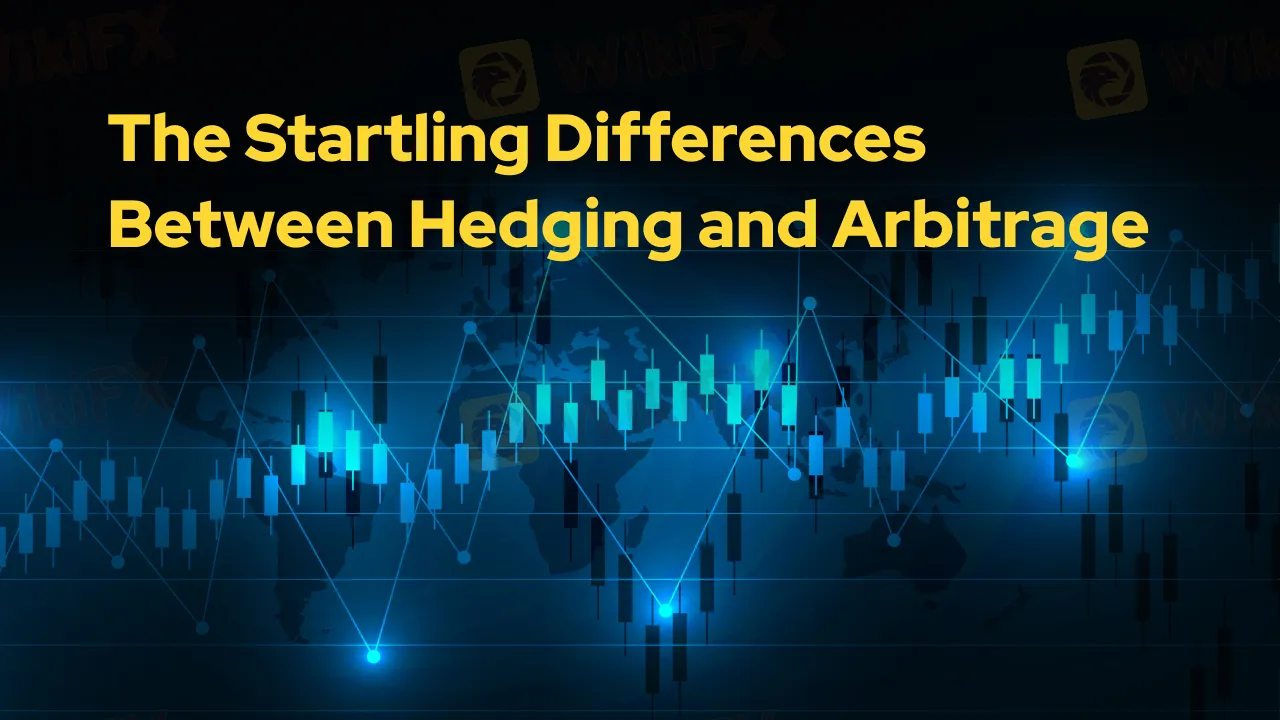简体中文
繁體中文
English
Pусский
日本語
ภาษาไทย
Tiếng Việt
Bahasa Indonesia
Español
हिन्दी
Filippiiniläinen
Français
Deutsch
Português
Türkçe
한국어
العربية
The Startling Differences Between Hedging and Arbitrage
Abstract:The two risk management investment tools - hedging vs arbitrage - have been helping investors achieve their respective financial goals. Explore this comparision to understand their functionalities, the investment purpose they serve, the risk attached, and several other aspects.

The two risk management investment tools - hedging vs arbitrage - have been helping investors achieve their respective financial goals. Arbitrage is a tool by which investors gain risk-free profits by leveraging price differentials across different markets. Hedging, on the other hand, is designed to reduce potential losses by offsetting risks. In this article, we will help you explore the differences between hedging and arbitrage and find out the suitable alternative for you.
Arbitrage Definition
Arbitrage is a calibrated strategy by which investors purchase an asset at a lower price in one market and sell it at a greater price in another market. This largely revolves around leveraging price differences to earn profits.
Example - A currency pair is trading at 1.1000 on one exchange and at 1.1003 on another exchange. So, an arbitrageur will buy the currency pair available at 1.1000 and sell it for 1.1003 to gain a profit of 0.0002.
The strategy works brilliantly amid varying prices across markets. However, as markets become increasingly efficient, the profits tend to diminish.
Hedging Mechanism
Hedging is a proven financial investment strategy that helps reduce the risks associated with price movements in an asset. It helps offset a position by using some derivatives, such as futures or options, to protect against potential loss. For example, exporters expecting payment in Euros can enter into a forward contract to lock in the exchange rate to hedge against currency fluctuations.
The hedging mechanism helps stabilize cash flows and financial results while protecting against unfavorable price movements. On the downside, it reduces potential upside gains for the investors. At the same time, investors need to pay costs such as premiums or meet margin requirements.
Differences Between Hedging and Arbitrage
Still confused which of the two - Hedging vs Arbitrage - is better for you? We get it clear for you through this comparative analysis based on various aspects such as the investment objective, risk, time horizon, etc.
Investment Objective
Arbitrage is designed to maximize profits for investors, while hedging deals with minimizing investment risks for them.
Investment Risk
Arbitrage is a risk-free approach to reaping profits, while hedging helps reduce risks, but it may not be able to eliminate them.
Primary Tools
Arbitrage leverages market inefficiencies to help investors post high profits, while hedging uses derivatives such as futures, options or swaps to mitigate investment risks.
Time Horizon
Arbitrage works well over the short term, whereas hedging works better over the long term.
Market Impact
While arbitrage helps equalize prices across markets, hedging leads to stabilizing financial outcomes.
Summing Up
Hedging and arbitrage help investors with their unique characteristics. While arbitrage ensures efficiency by leveraging price differences, hedging protects against market uncertainties. Traders, based on their investment goals, exercise either of these two options to navigate a seemingly complex financial market.
Frequently Asked Questions (FAQs) on Hedging vs Arbitrage
Can I Use Hedging and Arbitrage Together?
Yes, you can use both of these strategies that serve your different investment purposes.
What are Some Common Hedging Instruments?
These are futures, options, forwards, and swaps
Can Arbitrage Ensure Profits Every Time?
While arbitrage is indeed a tool to earn risk-free profit, it does not guarantee it every time. Factors such as transaction costs, execution risk and market volatility can erode or eliminate profits.
Why Investors Resort to Hedging Amid Market Volatility?
Hedging helps protect investments from adverse price fluctuations and lets investors sail amid a highly volatile market.
We cant wait for you to join our growing community - WikiFX Masterminds. Scan the QR code today to join and discuss forex.

Disclaimer:
The views in this article only represent the author's personal views, and do not constitute investment advice on this platform. This platform does not guarantee the accuracy, completeness and timeliness of the information in the article, and will not be liable for any loss caused by the use of or reliance on the information in the article.
Read more

iForex - Where Withdrawal Denials, High Spread & Scams Spoil Your Forex Trading Mood
Are high spreads charged by iForex disallowing you to make profits? Do you feel that you will never be able to withdraw from iForex? It's nothing new! Read this exposure story where we have highlighted complaints from several investors.

Forex Hedging Strategies - Calming You Amid Market Chaos
Finding it hard to deal with the forex market volatility? Do those ups and downs in currency pair prices make you more nervous or worried? You need the right forex hedging strategies. As a concept, forex hedging is about strategically opening additional positions to stay immune against adverse forex price movements. It’s about offsetting or balancing your current positions by buying or selling financial instruments. As a trader, your risk exposure is reduced, hence limiting your potential losses.

Scam Alert: Cloned Broker Scams on the Rise
Reputed authorities like the FCA have issued warnings against brokers who act genuine but are actually fake brokers. They copy details such as logos, names, branding, and sometimes even employee appearances to trick investors and steal money from them.

Fraud Alert: Don’t Trust These Firms, SC Malaysia Warns
Investors, Pay Attention! This is a serious warning from the Securities Commission Malaysia against 5 scam brokers operating in the forex market without a legal license. Here is the list of 5 fake brokers you must avoid.
WikiFX Broker
Latest News
What Is Forex Currency Trading? Explained Simply
LSEG Announces £1 Billion Share Buyback Program
Ultima Markets enters the UK and gains the FCA license
SEC Lawsuit Targets Real Estate Fraud Scheme by Joseph Nantomah
A Beginner’s Guide to Trading Forex During News Releases
Forex Hedging Strategies - Calming You Amid Market Chaos
ASIC Regulated Forex Brokers: Why Licensing Still Matters in 2025
SkyLine Judge Community: Appreciation Dinner Successfully Held in Malaysia
Think Uncle Sam Owes $37 Trillion? It's Far Worse Than That
Interactive Brokers: A Closer Look at Its Licenses
Currency Calculator


